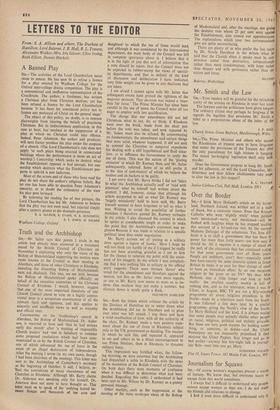Truth and the Archbishop
SIR,—Mr. Salter says that points I made in my article had already been answered in a statement issued by the British Council of Churches on November 6 explaining why only the views of the Bishop of Matabeleland supporting the motion were made known to the Council at their meeting in Aberdeen, and those of other Christians in Rhodesia, including the dissenting Bishop of Mashonaland, were not disclosed. This was, we are told, because the Bishop of Matabeleland spoke officially on behalf of the executive committee of the Christian Council of Rhodesia. I would, however, suggest that one of the most important functions of any Church Council about to vote on a highly contro- versial issue is a scrupulous examination of all the relevant facts and opinions, and this applies to minority and unofficial views as well as majority and official ones.
Commenting on the Archbishop's speech in Aberdeen, the Bishop of Mashonaland, Dr. Alder- son, is reported to have said 'that he had written early this month' after 'a meeting of responsible Church leaders' had 'met in Salisbury to consider some proposed resolutions which had been com- municated to us by the British Council of Churches, one of which advocated the use of force in the event of an illegal declaration of independence. After the meeting I wrote (in my own name, though I had been chairman of the meeting). This letter was sent to the Archbishop of Canterbury's secretary at the beginning of October. It will, I believe, re- `fleet the convictions of many churchmen of our Churches in Rhodesia.' Although Mr. Barry claims Dr. Alderson was speaking only for himself, Dr. Alderson does not seem to have thought so. This letter went on to speak of the 'undying hatred be- tween Britain and thousands of her sons and
daughters' to which the use of force would lead, and although it was considered by the international department, the main body of the Council was left in complete ignorance about it. I believe that it is in the light of just this sort of information that a vote should be taken; that the Council must not be expected to rubber-stamp the views of special- ist departments, and that in default of the kind of discussion and deliberation I have indicated, very little weight can be given to any decisions that are taken.
I am afraid I cannot agree with Mr. Salter that subsequent events have proved the rightness of the majority decision. That decision was indeed a 'man- date for force.' The Prime Minister has since been careful in the use of terms the Council were all too eager to employ with less qualification.
The charge that our amendment did not tell Christians what to say, do, or think, if Rhodesia went over the brink, made from the chair just before the vote was taken, and now repeated by Mr. Salter, must also be refuted. By concentrating on fundamentals, the amendment said certain things that were valid, whatever happened. It did not seek to commit the Churches to temporal expedients for dealing with a still hypothetical and fluid situa- tion, or to influence the Government to apply the use of force. This was the nature of the 'glaring omission' to which Dr. Ramsey then, and Mr. Salter subsequently, referred. Some of us still prefer it to the 'sins of commission' of which we believe the motion and its backers to be guilty.
I am sorry that Mr. Barry thinks I did not 'listen to what the Archbishop actually said' or 'read with attention' what he himself had written about the context. I did, however, notice that although his article purported to tell us what Dr. Ramsey was 'largely mistakenly' held to have said, Mr. Barry himself seemed to have forgotten to tell us what it was. Wishing to 'avoid the possibility of further mistakes, therefore quoted Dr. Ramsey verbatim in my article. I also discussed the context in which he spoke, at considerable length in order to make the point that the Archbishop's statement was ex- plosive because it was made in relation to a specific political issue then under negotiation.
Mr. Barry accuses me of 'posing as a solitary dove against a legion of hawks.' Here I hope he will not think too hardly of me if I suggest he really has not been attending, grateful as I am to him for the chance to reiterate my point with the assist- ance of his imagery. In my article I was complain- ing that I was nothing like as solitary as the official story suggests. There were thirteen 'doves' who voted for the amendment and therefore against the motion, not five as Mr. Salter once more repeats, or one as Mr. Barry now seems to want us to be- lieve. One swallow may not make a summer, but thirteen doves is surely quite a flock.
ELIZABETH HAMILTON


















































 Previous page
Previous page